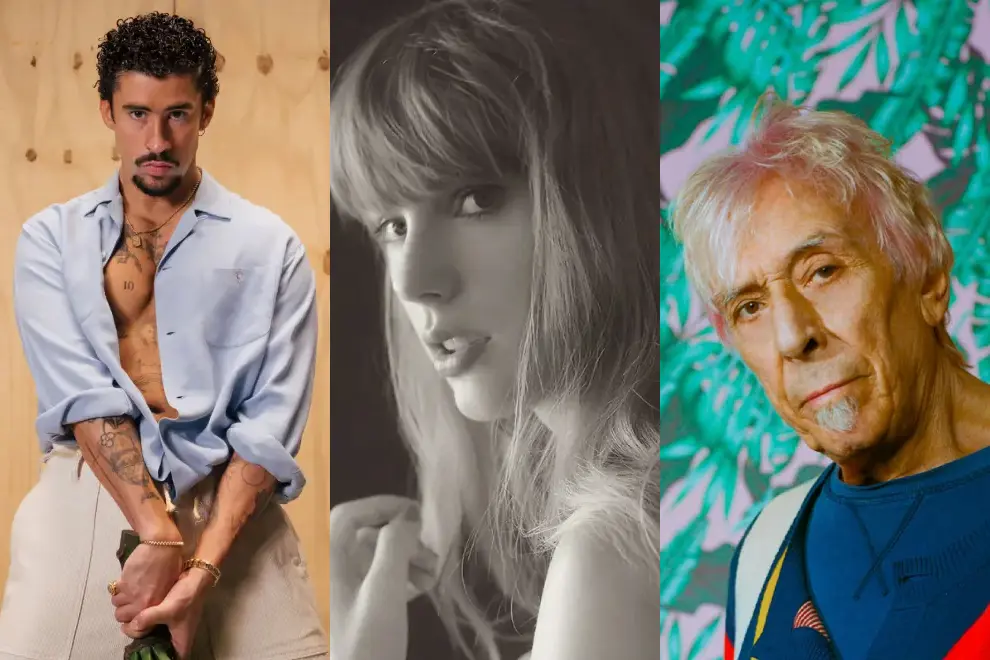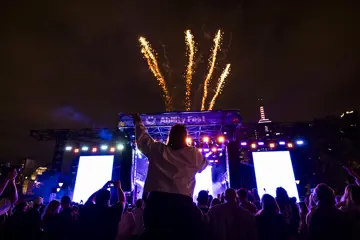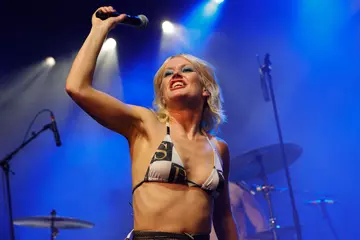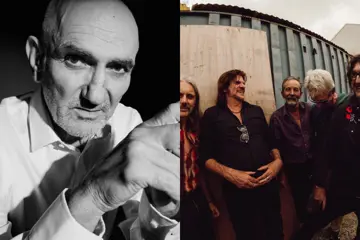 Taylor Swift
Taylor SwiftOn 16 February 2024, the excitement was palpable in Naarm/Melbourne as Taylor Swift prepared for the first of three record-breaking shows at the Melbourne Cricket Ground (MCG) – the largest stadium in the Southern Hemisphere.
The American pop megastar would perform to her biggest-ever audiences, totalling 288,000. Swifties milled around the CBD, killing time in retail stores before proceeding to Yarra Park. Little did fans know, but they were helping to boost the domestic economy amid a global downturn.
LOOK WHAT YOU MADE ME DO: TAYLOR SWIFT'S SWIFTONOMICS
With Swift returning to the live circuit post-COVID-19 pandemic, The Eras Tour led to an economic boom for cities like Naarm/Melbourne, reporter Augusta Saraiva dubbing the international phenomenon "Swiftonomics". Swifties' recreational spending bolstered local hotels, hospitality and retail (incidentally, in Australia, Crown Resorts was a presenter). Melbourne Airport experienced increased passenger volumes in its terminals, establishing a new post-pandemic record of 117,000 on the Friday. Fans flew in from New Zealand and South Korea.
Visit Victoria, the state's tourism company, capitalised on Swiftmania by promoting potential viral moments – Flinders Street Station illuminated with the sign “Welcome To Melbourne Swifties,” while her bops aired at nearby tram stops. The shows even attracted crowds of ticketless spectators outside 'The G', heightening the festive and communal atmosphere. Swift subsequently performed four more concerts at Eora/Sydney's Accor Stadium. Fortunately, The Eras Tour didn't result in service inflation – a bonus.
Don't miss a beat with our FREE daily newsletter
The billionaire musician, often criticised over her private jet usage and sizeable carbon footprint, prompted a plethora of glowing thinkpieces – as tertiary institutions, including the playfully renamed "La Trobe Universi-TAY," made experts available for comment on the tour's cultural and financial impact. Dr Paul Strickland, Senior Lecturer in Tourism, Hospitality and Event Management at La Trobe University, supplied quotes on the topic "Gold Rush: How Taylor Swift will help shake off Victoria's economy woes."
"This is a once-in-a-lifetime tourism and hospitality opportunity for Victoria," Strickland said. "Tourism and hospitality in Sydney and Melbourne are set to gain from her [seven] concerts. Locals will spend on average $300 on tickets, plus food and beverages. Interstate tourists will spend around $1,100 for additional accommodation and travel. We can expect this will inject more than $1.2 billion into the local economy."
Yet Strickland also suggested that positive media coverage of The Eras Tour could allow Naarm/Melbourne to overcome reputational damage as an events capital. "Recently, we've had three major negative events for Victorian tourism: the cancellation of the Grand Prix prior to lockdown; the extended lockdown with no tourists; and the cancellation of the Commonwealth Games. Taylor's concerts are massive for Melbourne – those lucky enough to secure tickets are helping us 'shake it off' and get 'out of the woods' financially."
Indeed, it was a not-so-cruel summer. Pollstar has since estimated that The Eras Tour sold over 10 million tickets globally, generating $3.4 billion.
HOT IN THE CITY: THE ENTERTAINMENT TRAVEL BOOM
Post-pandemic, there has been much angst over the viability of music festivals in Australia during a cost-of-living crisis, particularly since Splendour In The Grass, traditionally held every winter in the Byron Bay region, was suspended in 2024. But countering this is the growing trend of music tourism in Australia with its blockbuster concerts and metropolitan festivals, as highlighted by Christie Eliezer for TheMusic last year. Music may provide the ultimate immersive experiences.
The international surge in entertainment travel is continuing with a recent Trip.com Group Report (Momentum 2025: Travel's Next Big Trends) suggesting that nearly two-thirds (66 per cent) of travellers are planning itineraries around live events, creating further scope for cultural exploration. A 2024 CMI (Custom Market Insights) study projects that the global music tourism market will reach nearly 30 billion by 2032. Clearly, governments and DMOs (destination marketing organisations) recognise the potential in 'gig-tripping' as a means of economic stimulus as Australia recovers from the effects of COVID-19 border closures.
Apart from Splendour, Australian music fans once travelled abroad to attend Coachella and Glastonbury in the warmer Northern months – or to visit heritage music cities like Nashville, Detroit and Berlin.
Now, in winter, Australia has entertainment options closer to home, such as Vivid Sydney, RISING in Naarm/Melbourne, Dark Mofo in nipaluna/Hobart, and Illuminate Adelaide, each encompassing music, arts, and technology. Come December, Spilt Milk – the 2025 edition's buzz drawcards Kendrick Lamar and Doechii (who pulled out of an earlier Australian trek with 2022's Listen Out after contracting COVID-19) – will advantage regional hubs, with only Boorloo/Perth not sold out. But, as with The Eras Tour, Australia is also encountering more inbound tourism.
Naarm/Melbourne has long branded itself Australia's 'Music City' – and that is backed by data. According to a 2024 Roy Morgan brand health study, 41 per cent of Australians say that Naarm/Melbourne is Australia's live music capital (with Eora/Sydney at 20 per cent), and 14 per cent of people hope to enjoy live music in the city when visiting on a short domestic holiday.
Following June's RISING (as of 2020, the successor to both the Melbourne International Arts Festival and White Night), Naarm/Melbourne has Now Or Never (replacing Melbourne Music Week) and ALWAYS LIVE, all with cutting-edge music programs, and supported by government bodies and public institutions.
Then, over summer, the city hosts the Australian Open, which incorporates AO LIVE (formerly AO Finals Festival) – the sole music event run at a Grand Slam worldwide, currently curated by the Untitled Group (Beyond The Valley, Pitch Music & Arts, Ability Fest). In January, Kesha, Benson Boone and KAYTRANADA headlined.
Speculation is rife about the implication of cuts in the Victorian budget on contemporary music – organisers of the lavish ALWAYS LIVE responding to questions about the future in an Instagram post: "Don't believe everything you read… We're already gearing up for 2025 – backing local artists and businesses across the state, filling its stages and keeping Victoria front and centre as Australia's leading destination for live music. The amps are warming up. See you out there!"
At any rate, Brendan McClements, CEO of Visit Victoria, remains upbeat about Naarm/Melbourne's music scene and the proliferation of opportunities for the visitor economy.
"Melbourne is Australia's cultural heartbeat and one of the world's great live music cities – from intimate laneway gigs to stadium-filling spectaculars, our music scene draws artists and audiences from around the world," he says. "Major concerts like Taylor Swift at the MCG and music events like the Port Fairy Folk Festival don't just inspire music lovers, they drive real economic impact – filling hotels, restaurants and venues right across the state.
"Every ticket sold supports local jobs, small businesses and creative talent, which is why music is such an important part of our record $40 billion visitor economy."
RAY OF LIGHT: ILLUMINATE ADELAIDE
Tarndanya/Adelaide is giving Naarm/Melbourne some healthy domestic competition in Illuminate Adelaide – the city establishing its profile as a music destination with the internationally renowned WOMADelaide.
The nascent arts festival is augmenting Tarndanya/Adelaide's night-time economy off-season, but also enticing an older audience and families. "In 2024, we saw more than 23,000 visitors from interstate and overseas for Illuminate," says Lee Cumberlidge, Co-founder and Creative Director, alongside Rachael Azzopardi. "The demographics are very broad – 13 per cent are 18–24, 28 per cent are 25–34, 23 per cent are 35–44… However, we have a large cohort in the 55-plus age range at 19 per cent!"
Illuminate, in its fifth year, has yielded economic and cultural dividends for the entire city, allowing South Australia to showcase other assets. As with Vivid Sydney in 2023, the festival has introduced a culinary program, Illuminate Hosts – experiential dining, yet another travel trend.
"The economic benefit is clear as we measure that every year," Cumberlidge affirms. "In 2024, Illuminate delivered $43.9 million in economic benefit to the state. The cultural benefit is also evident, but much harder to measure. We really feel that Illuminate reflects the city's aspirations to be an innovative hub for creativity and technology and to deliver first-class experiences that are contemporary and future-facing.
"We know that the state's festivals generally enhance the vibrancy and liveability of the city – and Illuminate has become a very important part of that, delivering significant economic and cultural benefits in the quieter winter months. And, lucky for us, our audiences are more than happy to rug up, brave the chill and make a night of it."
Australian cities are increasingly hosting exclusive events to drive visitation. In late 2023, Boorloo/Perth facilitated two one-off Coldplay concerts on their epic Music Of The Spheres World Tour, presented by Live Nation and the Western Australian Government through Tourism WA.
Notably, the spectacle at Optus Stadium was actually marketed to fans in the Asia-Pacific region. The British band astutely lined up homegrown supports: Amy Shark, Thelma Plum, Tash Sultana and rising stars Adrian Dzvuke and King Ibis. The dates injected $68 million into the economy. (Ironically, Coldplay returned the following year for shows in Naarm/Melbourne and Eora/Sydney.)
Yet singularity is crucial, too, for festivals to build hype. In 2018, Vivid Sydney – still Australia's largest and most prestigious arts festival, despite being tarnished by recent controversies over the alleged artwashing of its corporate sponsors and gentrification in ostracising the unhoused community – presented Solange for four extravaganzas at the Sydney Opera House, tickets sold by ballot. In fact, Solange had previously performed at intimate venues here in 2012, but she reached a wider listenership four years later with her concept album A Seat At The Table.
This year, Illuminate has booked the octogenarian John Cale as marquee act for Unsound Adelaide – the festival-within-a-festival challenging the status of Naarm/Melbourne as Australia's 'Techno City'. Cale, likewise appearing in Eora/Sydney, co-founded The Velvet Underground, going on to produce The Stooges, Patti Smith, Happy Mondays and Siouxsie And The Banshees. But he's revered as an avant-garde figure in electronic music circles for his experimental solo output, even latterly lending his vocals to a Kelly Lee Owens track.
"Our music program does attract significant visitation from outside the state, so it is an important driver of tourism during Illuminate," Cumberlidge says. "We consciously curate a unique mix of music programming that will appeal to audiences nationally, and we focus it on the weekends so that people are more likely to make the trip."
Again, Cumberlidge stresses that Illuminate is "offering experiences in the program other than music so that people can also enjoy a range of things while they are in the city," such as the free City Lights installations – the stuff of influencer content.
TURISTA: BAD BUNNY
Will the next Swift Lift-like marvel be Bad Bunny's DeBÍ TiRAR MáS FOToS ('I Should Have Taken More Photos') World Tour?
In early 2026, Borinquén/Puerto Rico's flamboyant King Of Latin Trap will hit Australia for the first time, performing two exclusive blockbusters at Eora/Sydney's ENGIE Stadium (aka Sydney Showground Stadium), capacity 23,500. Expect los conejos (the bunnies) to descend on the city.
A gamechanger, Bad Bunny (Benito Antonio Martínez Ocasio) broke out with 2016's single Diles ('Tell Them'). But he went global as a feature artist alongside J Balvin on Cardi B's mega-hit I Like It and has had successive smash albums.
Martínez has done much to defy residual Anglocentrism in the music industry. In 2023, he became the first act to receive a Grammy nomination for 'Album Of The Year' with a Spanish language release in Un Verano Sin Ti ('A Summer Without You') – although Swift's Midnights won – and the first Spanish language act to headline Coachella.
His latest album, DeBÍ TiRAR MáS FOToS, pays homage to Borinquén/Puerto Rico with socio-political themes such as ethnic identity, cultural memory and the legacy of colonialism in the Caribbean – the American territory's geopolitical status tenuous because it lacks congressional representation.
The DtMF star is now making history as the first Latin act to head stadiums internationally on a 56-date tour launching in November in Santo Domingo, the Dominican Republic. It's already sold 2.6 million tickets globally. Spain will have 12 shows alone.
Fans have theorised why Australia managed to land dates over the US – some suggesting that Martínez is protesting the Trump administration's racial discrimination and immigration policies.
Martínez addressed that "conspicuous absence" in a recent Variety cover story, stating that "it's unnecessary" for him to again tour the US. It's a logical decision, too, as the streaming sensation covered North America last year with his sold-out Most Wanted Tour and might simply be avoiding over-saturation.
In July, Martínez will start a 30-date residency, NO ME QUIERO IR DE AQUÍ ('I Don't Want To Leave Here'), in Borinquén/Puerto Rico's capital, San Juan – the initial nine shows pointedly reserved for inhabitants. The scheme is anticipated to boost Borinquén/Puerto Rico's tourism industry with 200,000 concertgoers travelling to the island for the remaining dates.
Gauging by the lyrics to his song TURiSTA, the reggaeton phenom understands the paradoxical role touristification (and geographic mobility, since many Americans perceive Borinquén/Puerto Rico as a tax haven) plays in gentrification and displacement. Yet, in claiming a stake in the island's economic and infrastructure development, Martínez is asserting Borinquén/Puerto Rico's right to self-determination – and modelling responsible tourism.
So, what does all this mean for Australia? Live Nation's Renée Hermsen stresses that "the artist and his team decide where to tour," adding that, "Australia has been a top-of-mind market for Latin music expansion for years. Sydney is an exciting multicultural city with a growing Latin community and movement, further cementing Latin music as a mainstream genre.
"Bad Bunny was a no-brainer for Australia thanks to his global success across several arena and stadium tours in a demanding market like the US and LATAM, and the fact he's smashed streaming [platforms] worldwide. He confirmed in the pre-sale that he is a music powerhouse, selling multiple stadiums in places like Sweden, Australia, the Netherlands and Brazil, driving fan demand that only the biggest acts in the world generate."
Martínez enjoyed an ARIA Top 20 album with DeBÍ TiRAR MáS FOToS, but even then, the response to his Australian tour has been unprecedented – a second date was announced "due to extraordinary demand" after the first quickly sold out.
"We knew it was going to be a big on-sale and we count ourselves lucky he wanted to do two shows – so more than 80,000 people will see him play in this part of the world for the first time," Hermsen says. "Bad Bunny is the first and only Latin artist to sell out a stadium in Australia and is on track to be the biggest-selling Latin act ever in the country."
Could the DeBÍ TiRAR MáS FOToS World Tour match the fever of The Eras Tour, with similar flow-on effects? Hermsen corroborates that there has been interest from interstate and internationally. "Australian fans are definitely showing up for Bad Bunny, with representation from all states, and we are thrilled to see nearly 10 per cent of ticket buyers are international fans making the trip from as close as NZ to as far as Spain [and] North and South America."
Live Nation acknowledges the possibilities of music tourism in marketing strategies as well as globalisation. "Our mission is to help bring more live music to the world, including Australia – and a lot of that involves helping artists play new places and get closer to their fans. Of course, some fans may still want to travel to see an act they love, which can contribute to interstate and international tourism – which we've seen with artists like Coldplay, TWICE, Stray Kids and now Bad Bunny."
But does Hermsen believe that officials are doing enough to nurture the expanding music tourism market? "There are some real opportunities for governments to get involved in growing music tourism, particularly some of those one-off opportunities that deliver huge returns on investment," she says.
"In November 2023, we hosted two sold-out Coldplay concerts at Perth's Optus Stadium, which reportedly generated over $40 million in economic benefits, specifically from out-of-state fans, for Western Australia. There is still significant untapped demand to grow the live music economy – and it's great its value is being recognised."
This piece of content has been assisted by the Australian Government through Music Australia and Creative Australia, its arts funding and advisory body

















